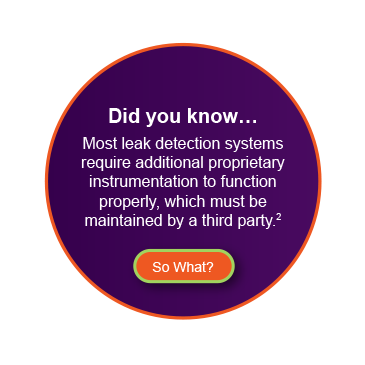YOUR CHALLENGE:
EXTRANEOUS EQUIPMENT ADDS COMPLEXITY AND POINTS OF FAILURE
With the push to run lean and get more out of aging equipment, most mills have embraced some form of leak detection system
— and the variety of instruments and sensors that come with it.
While these components may have been sold based on reducing the number of physical tasks workers need to do around the boiler,
they require lots of maintenance and calibration to keep accurate. And the fact is, the majority of leak detection systems are
prone to false alarms, which create more work for the operator.

Third-party maintenance contracts aren’t just expensive. Outsiders simply don’t know your equipment as well—and they’re often not available when you need them.
If you’ve invested heavily in third-party leak detection equipment, you may feel locked into a complexity spiral.
If you’ve invested heavily in third-party leak detection equipment, you may feel locked into a complexity spiral.
One-dimensional data (e.g., acoustic signals, chemical markers, etc.) is only as reliable as your vendor’s maintenance schedule, putting you at risk for missing warning signals if a sensor hasn’t been recently serviced. And, overly sensitive calibration can result in multiple false alarms
One-dimensional data (e.g., acoustic signals, chemical markers, etc.) is only as reliable as your vendor’s maintenance schedule, putting you at risk for missing warning signals if a sensor hasn’t been recently serviced. And, overly sensitive calibration can result in multiple false alarms.
Ultimately, something that was supposed to simplify your life introduces a whole new set of complexities and points of failure.
THE SOLUTION:
TRADE MAINTENANCE FOR MASTERY
![]()
DETECT LEAKS BY MONITORING ONLY YOUR OWN EQUIPMENT
![]()
With a monitoring system that needs no extraneous equipment—just a server to run on and a connection to your DCS—you’ll avoid costly downtime for installation, reduce complexity and maintain control of your operational destiny.
![]()
![]()
ADJUST ANALYTIC SENSITIVITY TO REDUCE FALSE ALARMS
![]()
Use a unique learning algorithm that incorporates both historical and real-time data to fine-tune sensitivity over time, automatically making adjustments to correct for instrument drift, so you can proactively avoid false alarms.
![]()
![]()
GO BEYOND SURFACE OBSERVATIONS AND TAKE CONFIDENT ACTION
![]()
When you see more of what’s happening in your boiler, you’ll quickly build strong cases for what action should be taken and why, increasing operator confidence and knowledge, and minimizing employee exposure to danger.
![]()
![]()
Click here to learn more or contact your Buckman representative.
Main Page | Challenge 1 | Challenge 2 | Challenge 3

2. “Automation Update: What Does the Future Hold?” Paper360, April 2019.
The Recovery Boiler Advisor (RBA) is a support tool for use and incorporation in your comprehensive recovery boiler monitoring program. The RBA is focused on providing the operators with additional information and monitoring which allows operators to make decisions based on data, experience and expertise. The operator, and not the RBA, must always be the final determining factor as to what type of intervention is required.